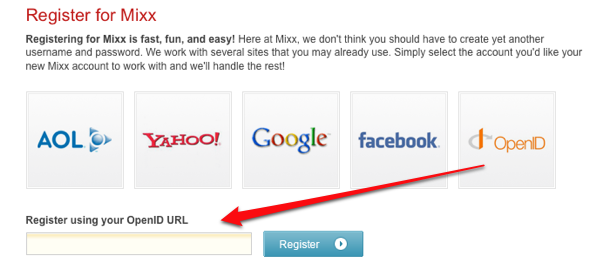After nearly four years of development and proselytization, social networking technology standard OpenID is beginning to show signs of going more mainstream on the web. The service is live in a number of company web sites and consumer-facing services, from airlines to social networks — and, while it’s too early to tell how well OpenID might do in the future, new numbers from the industry-driven OpenID Foundation indicate more people are logging in through it.
For those who aren’t familiar, OpenID makes it easy to sign into a new web site without creating a new username and password. Instead you use the URL you’ve created for a service that you already use. So if you have a personal blog at wordpress.com you might use your yourname.wordpress.com URL. When you go to a new web site that accepts OpenID logins, just click on the OpenID button, type in your preferred URL and click to log in.
Or that’s the idea. In practice, the user interface has involved a lot of clicking around to manage different approvals — it hasn’t been a seamless, intuitive experience for the average web user. And new seemingly competing services have emerged that make transporting your identity even easier. The most prominent, Facebook Connect, lets you sign into a new site using your Facebook identity with a single click. It lets you share information from that site back to Facebook with another click.
But Facebook itself is on the board of OpenID — along with Google, Microsoft, Yahoo, IBM, PayPal and Verisign. These and many other industry leaders seem to be paying more than lip service to the idea of distributing identities through open standards. In fact, a Facebook representative is co-chairing an OpenID committee aimed at improving its usability. The point of OpenID, as all of these companies seem to accept, is that users don’t want to use just any one service to sign in everywhere. Instead, users should have the choice to log into any site using any other identity. Making it easier for people to log in anywhere just means more people will log in overall — and potentially become users of any of these companies.
That’s the thing. While site-specific identity networks like Connect are designed around the site itself, OpenID is a simple feature that can be customized to fit the interfaces of sites that use it. The improving interface seems to account for the growth some relatively small, niche sites are reporting, as published by the foundation today:
- Sulit.com.ph (a Filipino e-commerce site): 15% of new registrations are via OpenID, up from 10% a couple of months ago
- 37 Signals: 15% of logins are via OpenID on their Basecamp productivity application
- Mixx: UI improvement resulted in ten-fold increase in registrations via OpenID and third-party services. 20% increase in registrations from direct and referrer traffic.
- AFI (Rock band, event promotion): “We were blown away with the fan response. In two weeks we received 850 (YouTube video) submissions, had 12,500+ fans register on the website, 10,000+ comments, and over 100,000 votes to select our winners.”
- Get Satisfaction: Deployments for their customers — Twitter and Songbird — are seeing OpenID utilization of 20% or more
- Sourceforge.net: OpenID login has grown to about 10% of total logins
- Stackoverflow: Third-party registrations have grown from 10,000 to 50,000 users in a couple of months
Japan Airlines also introduced a customized version of OpenID that reached across a federation of car rental and hotel web sites, and it’s seen a 100 percent increase in partner registrations as a result.
Earlier this month, the foundation said that more than 40,000 sites currently accept logins using OpenID, and some 1.5 billion accounts can be used as OpenIDs. What OpenID doesn’t offer are numbers on how many of these users access a site through OpenID each month. But the fact that a wide range of niche sites are seeing increasing usage seems to mean OpenID is at least on the right track to becoming more mainstream.
VentureBeat's mission is to be a digital town square for technical decision-makers to gain knowledge about transformative enterprise technology and transact. Learn More

